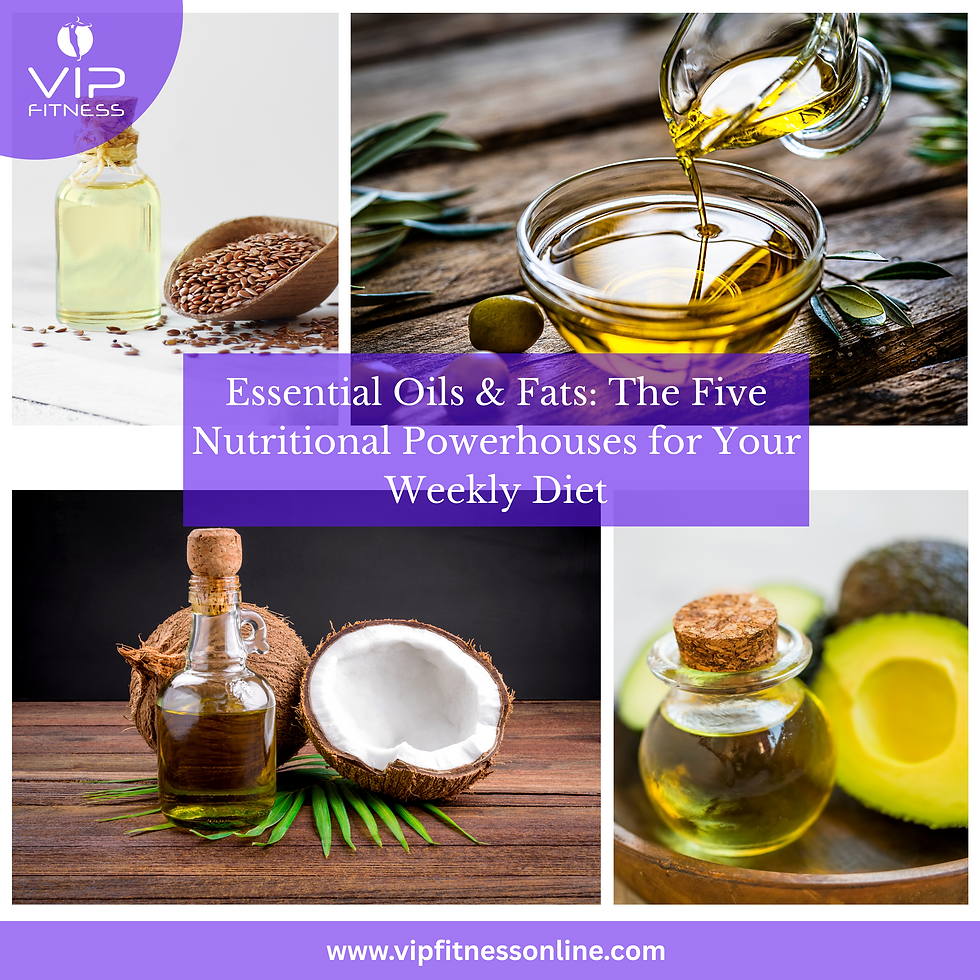Essential Oils & Fats: The Five Nutritional Powerhouses for Your Weekly Diet
- Clare David

- Aug 31, 2025
- 3 min read

1. Extra Virgin Olive Oil (EVOO)
Nutritional Facts:
- Rich in monounsaturated fats (about 73%).
- Contains antioxidants like vitamin E and polyphenols.
- Lowers bad cholesterol (LDL) and increases good cholesterol (HDL).
History:
Originating from the Mediterranean, olive oil has been a staple in diets for thousands of years, prized by ancient civilizations like the Greeks and Romans. The production involves cold-pressing olives, preserving their nutrients and flavours.
Cellular Benefits:
EVOO's antioxidants combat oxidative stress at the cellular level, reducing inflammation and supporting heart health. The monounsaturated fats promote better cell membrane integrity, improving nutrient transport and cellular communication.
Weight Loss Benefits:
EVOO can promote feelings of fullness, helping to curb overeating. Its antioxidants may also support metabolic health, which is beneficial for weight management.
2. Coconut Oil
Nutritional Facts:
- Contains medium-chain triglycerides (MCTs) that are easily digestible.
- High in saturated fats (about 87%).
- Provides quick energy and supports metabolism.
History:
Coconut oil has been used for centuries in tropical regions, particularly in Southeast Asia and the Pacific Islands. The extraction process involves pressing fresh coconut meat to obtain oil, which retains its flavor and nutrients.
Cellular Benefits:
MCTs in coconut oil are rapidly absorbed and used for energy, supporting brain function and cognitive health at the cellular level. Its antimicrobial properties can enhance gut health, promoting a balanced microbiome.
Weight Loss Benefits:
MCTs can increase energy expenditure and fat oxidation, potentially aiding in weight loss. Coconut oil may also enhance satiety, leading to reduced calorie intake.
3. Avocado Oil
Nutritional Facts:
- High in monounsaturated fats (about 70%).
- Contains lutein, vitamin E, and omega-3 fatty acids.
- Supports heart health and reduces inflammation.
History:
Avocados originated in Mesoamerica and have been cultivated for thousands of years. Avocado oil is extracted from the flesh of the fruit, preserving its rich nutrient profile.
Cellular Benefits:
The high monounsaturated fat content supports cell membrane fluidity, enhancing cell signaling and nutrient absorption. Lutein contributes to eye health, while antioxidants protect cells from damage.
Weight Loss Benefits:
Rich in monounsaturated fats, avocado oil can help you feel full and satisfied after meals, reducing cravings for unhealthy snacks and aiding in weight management.
4. Flaxseed Oil
Nutritional Facts:
- Rich in omega-3 fatty acids (alpha-linolenic acid, ALA).
- High in lignans, which have antioxidant properties.
- Supports heart and brain health.
History:
Flaxseed has been cultivated since ancient times, with origins traced back to Babylon. The oil is extracted from flaxseeds through cold-pressing, preserving its essential nutrients.
Cellular Benefits:
Omega-3 fatty acids in flaxseed oil are crucial for reducing inflammation and promoting healthy cell membranes. They support brain function and cardiovascular health by improving blood flow and reducing clotting at the cellular level.
Weight Loss Benefits:
The omega-3 fatty acids may help regulate appetite by influencing hormones related to hunger and satiety. The fiber content in flaxseeds (when consumed whole) also contributes to feelings of fullness.
5. Butter (Grass-Fed)
Nutritional Facts:
- Contains short-chain and medium-chain fatty acids.
- Provides fat-soluble vitamins A, D, E, and K.
- Supports metabolic health and hormone production.
History:
Butter has been made for thousands of years, with evidence of its use in ancient cultures. Grass-fed butter is produced from cows that eat a natural diet, resulting in higher nutrient content.
Cellular Benefits:
The unique fatty acids in grass-fed butter can enhance cellular function, promoting energy production and hormone balance. The fat-soluble vitamins support overall cellular health and development.
Weight Loss Benefits:
While higher in calories, grass-fed butter contains beneficial fatty acids that can promote satiety. Incorporating moderate amounts can help balance meals and reduce the urge to snack between meals.
The Fat & Oil Conclusion
Incorporating these top five oils and fats into your weekly diet can provide a myriad of health benefits at all cellular levels. They not only enhance flavours and meal satisfaction but also promote satiety, support weight loss, and improve body composition. Embrace their rich histories and flavors while nourishing your body from the inside out!
Clare David



Comments